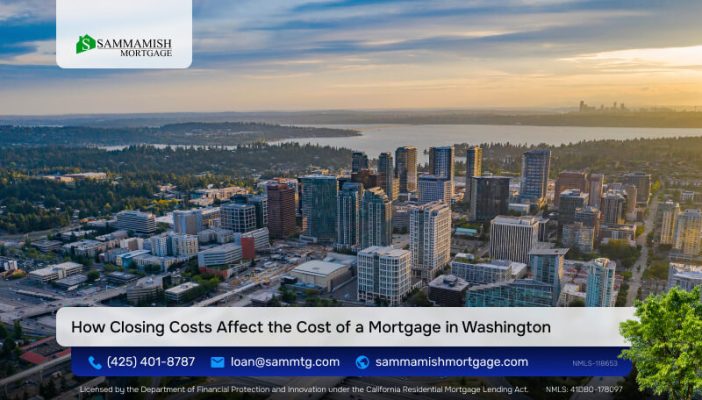No Obligation and transparency 24/7. Instantly compare live rates and costs from our network of lenders across the country. Real-time accurate rates and closing costs for a variety of loan programs custom to your specific situation.

Most home buyers in the state of Washington have to pay closing costs when purchasing a home. These are the fees and charges that accumulate when a person uses a mortgage loan to buy a house.
For a typical home purchase in the state of Washington, closing costs can easily add up to tens of thousands of dollars. So it’s an important expense you should plan for in advance.
In this guide, we’ll focus on a specific aspect of expenses at closing, by examining how closing costs can affect the cost of a mortgage in Washington.
Closing costs in Washington are a collection of fees charged by various parties involved in a real estate transaction. Home buyers must pay these costs in order to finalize the sale and take ownership of the property (which is what it means to “close”).
Some costs—like the lender’s fees—can vary by mortgage type and from one lender to the next. Others, such as recording or transfer taxes, are set by local or state governments.
The average closing costs in Washington usually range from 2% to 5% of the purchase price. So, for a $600,000 home (the current median home price in Washington), the costs could range from $12,000 to $30,000.
As you can see, this can be a significant expense. That’s why it’s so important to plan for closing costs in advance, and to understand how they affect your total mortgage loan costs in Washington.
The method you use to pay your closing costs in Washington can also affect your overall mortgage costs, and the amount of cash you need up front.
Home buyers in Washington basically have two options:
So, should you pay closing costs upfront or finance? The first option is most common, and not all lenders will offer the second option. So you’ll want to inquire about this in advance if it’s a concern.
This is the most straightforward and common approach. With this option, the home buyer uses their savings to cover all costs at the time of closing.
The advantage here is that you’re not adding onto the principal mortgage balance. This results in a lower loan amount and smaller monthly payments. It can reduce total interest costs as well.
The downside is that you have to come up with more cash up front. This can be a hurdle for some home buyers, especially in the more expensive parts of Washington.
Paying all of your costs in advance could also deplete your savings, leaving you with less cash for immediate post-closing expenses like moving, furniture, or repairs.
This option involves adding the closing costs to your total loan amount. The lender essentially finances these costs for you. This is sometimes referred to as a “no-closing-cost” mortgage, although the costs are not waived but merely financed. So, when you roll closing costs into the mortgage, you may not pay them up front, but will pay them via your mortgage payments.
The obvious advantage with this strategy is that it lowers your upfront cash requirement. You’ll need significantly less cash to close on the home. This can make homeownership more accessible for those with limited savings.
It also preserves whatever cash reserves you currently have. You’ll be able to retain more of your savings for other expenses or emergencies after closing.
The downside is that you’ll end up with a bigger loan amount. The mortgage principal would be larger because it includes the closing costs. This means bigger monthly payments and more interest paid over the life of the loan.
Also, some lenders might require a slightly higher interest rate when rolling in WA mortgage closing costs to offset their upfront expense. And not all mortgage lenders in Washington offer this option.
The bottom line: Most home buyers in Washington choose to pay their closing costs up front. Rolling them into the loan is less common and typically carries a higher interest rate or added fees to offset what the lender covers at closing.
Here’s how closing costs and loan amount compare:
As you can see, closing costs can eat up a good chunk of your savings. To reduce your upfront costs when buying a home in Washington, consider the following tips:
Closing costs can have a direct impact on the total cost of your mortgage loan and the amount you have to pay up front. So it’s an important subject that warrants additional research.
The good news is that you shouldn’t encounter any surprises along the way.
Mortgage lenders in Washington are required to present you with an estimate of your closing costs when you apply for a loan, followed by a finalized list shortly before closing day.
In summary, all home buyers should be familiar with how closing costs affect the cost of a mortgage in Washington. This will help buyers budget more effectively and understand the full picture of the financial commitment required to purchase a home in Washington.
If you’re looking to buy in Washington State, we can help. At Sammamish Mortgage, we offer various mortgage options for you to choose from, and have been helping clients across the entire Pacific Northwest since 1992, including those in WA, CA, ID, OR, and CO. Visit our website to get an instant rate quote or call us today to have your mortgage questions answered!


Whether you’re buying a home or ready to refinance, our professionals can help.
{hours_open} - {hours_closed} Pacific
No Obligation and transparency 24/7. Instantly compare live rates and costs from our network of lenders across the country. Real-time accurate rates and closing costs for a variety of loan programs custom to your specific situation.
Adjust the parameters based on what you want to track